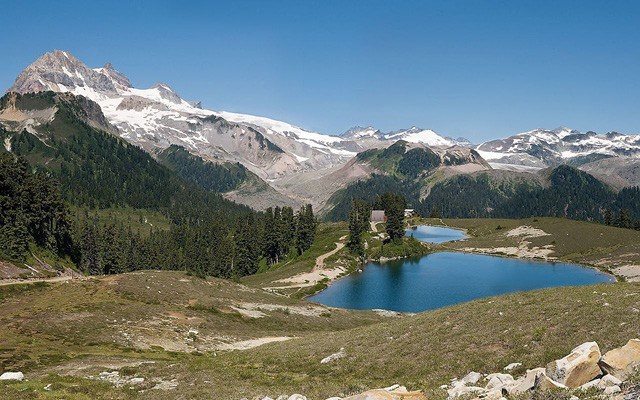Whistler Blackcomb (WB) continues to stand firm as local hiking groups pressure the ski resort to improve access to the Singing Pass in Garibaldi Park.
"If Whistler Blackcomb are prepared to make a huge investment to increase their business in Whistler (through the $345-million Renaissance expansion plan), they should be prepared to spend a tiny fraction of this on re-establishing public access to Garibaldi Park," read a recent letter to Pique from Federation of Mountain Clubs of B.C. (FMCBC) member Rupert Merer.
The contention over hiking access to the park can be traced back to the 1960s, when land was transferred from Garibaldi Park to Whistler Blackcomb's new ski area. Merer said mountain clubs approved the transfer at the time with the province's assurance that access to the park, Singing Pass and the Russet Lake hut would not be compromised.
Before the 1991 Fitzsimmons slump, a one-million-cubic-metre mass of earth that is in danger of toppling into Fitzsimmons Creek, hikers were permitted to use an old logging road west of the creek to a parking lot five kilometres above the village. Whistler Blackcomb closed that road following the slump, however, adding 10 kilometres to the return trip and "severely restricting" hiker access to the park, Merer said. A 2014 amendment to the Garibaldi Park Master Plan also included support from BC Parks and Recreation Sites and Trails BC to allow vehicle access up to an area near the park's boundary, but Victoria ultimately overruled this recommendation.
"We just think that maybe there haven't been enough checks and balances on this issue," Merer said. "Somehow the fact that there was vehicle access to the Upper Fitzsimmons has somewhere gotten forgotten."
Along with the Fitzsimmons slump, park access on the Whistler Mountain side has been complicated by the rise in popularity over the years of the Whistler Mountain Bike Park, the busiest downhill park in the world, explained WB's VP of planning Doug Forseth.
"(Mountain biking) has continued to develop to the point now that even if we could secure the land in the slump area, we wouldn't open up that road again because it's a conflict between many bike riders every day and what I would guess would be a few cars," he noted. "Putting cars and vehicles into that area doesn't make sense."
Merer countered by saying that only two of the bike park's 73 trails actually cross the access road, and that the crossings could "easily be made safe at a modest cost" by building a bridge or fencing.
"(The downhill trails are) like a funnel," Forseth noted. "You've got more stuff up top, and as it funnels down, it funnels to fewer and fewer trails, so those two trails (crossing the access road) get a lot of traffic."
The Fitzsimmons side isn't the only way to access Garibaldi, however. The FMCBC and other mountain groups prefer the Blackcomb route, which would usher hikers along a road near the Whistler Sliding Centre that is currently restricted to WB vehicles. Whistler Blackcomb has expressed concerns over this option as the company feels the road is too steep and narrow for safe public access.
"The point (hiking groups) often make is that there are roads more difficult than that around," said Forseth. "Yeah, potentially, but probably not with the kind of mountain traffic that we have there — it's a working road.
"We have fuel deliveries that go up and down that road. We have to communicate carefully with all of our summer traffic — that's how we access Blackcomb in the summer from Whistler Blackcomb's business standpoint.
"There's radio protocol from a safety standpoint to go up that road, people have to have radios in their trucks, they have to go through training, and get the radio from us to go up there. How do we do that with the public?"
The issue is further complicated by the incoming Spearhead Huts project, which is slated to bring three backcountry huts to the Spearhead Traverse in Garibaldi Park. Whistler Blackcomb has concerns over the added traffic — the huts are estimated to welcome up to 7,000 guests a year — in the park, while the project's proponents warn that construction costs will be significantly higher if there isn't direct road access.
"It'd be very difficult to build those huts if we have to fly everything in from the village," said Merer, who also serves as a director for the Spearhead Huts Society.
Merer believes WB also stands to benefit financially from the Spearhead Huts project.
"We think the Spearhead Huts will provide them with additional income of over $400,000 a year. In the winter and summer (guests) will use the lifts — mainly on Blackcomb — to get to the alpine to come to the huts," he explained. "There are lot of ways this will help them."
Forseth said WB has looked at a variety of options to appease local hiking groups — like offering discounted Peak 2 Peak 360 Experience passes to club members, but were ultimately turned down.
"We were told, 'we're a non-motorized entity and we don't want to use the lift to go hiking,'" Forseth said of the discussions with FMCBC and the Alpine Club of Canada's Whistler chapter. "But they do want to drive halfway up the mountain, so I don't get it. There seems to be a conflict in their philosophy."
Forseth added that WB is willing to reopen discussions in the future, but for the time being, the two sides seem to be at an impasse.
"I'd just reiterate that ourselves and other parts of the working group... have all said we're not putting this away forever," Forseth said. "We will pick it up again when the time is appropriate, and that's really when we see something that's changed in the environment, when there's some new information we should be including in the consideration of what we can do here and how we can figure this out."




